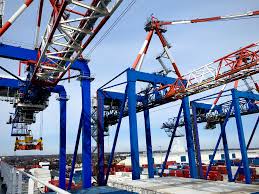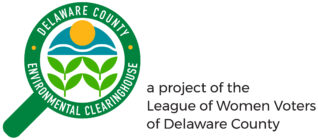DEP meeting on Penn Terminals fumigation permit draws little attention
A meeting to inform residents about plans by Penn Terminals to expand the use of pesticides at its Eddystone facility brought out only a handful of people and no one from Eddystone.
According to the DEP, the U.S. Department of Agriculture requires Penn Terminals to perform fumigation of incoming goods, while the Environmental Protection Agency requires it to obtain a permit to expand its use of the toxic chemicals used to kill insects, rats and mice that come into the port with fruits, vegetables and other goods.
About 15 members of Chester Residents Concerned for Quality Living protested the meeting at Latham Hall on the Widener campus, calling it a “sham” and demanding a formal public hearing in Eddystone.
DEP officials said the permit is a minor action that didn’t rise to the level of a formal hearing, but said the public could comment in writing.
CRCQL Chair Zulene Mayfield argued that DEP is required to have a hearing in an environmental justice area for any permit “major or minor.” The DEP has designated the riverfront industrial corridor from Eddystone to Marcus Hook as an environmental justice area where residents are already overburdened by air pollution, noise pollution and social stressors.
A bill pending in the PA House, HB 109, would require public hearings in environmental justice areas and would give the DEP the power to reject or add additional requirements to permits but the legislation has not progressed.
Mayfield accused the DEP of failing to inform Eddystone residents of the meeting. No one from Eddystone was at the meeting, according to a show of hands.
“You all didn’t put one piece of literature in Eddystone, not one,” she said, noting that the meeting was being held in Chester, rather than in Eddystone.
The permit would allow Western Fumigation to use more than 1,000 pounds per year of two chemicals, methyl bromide and sulfuryl fluoride.
Both chemicals are toxic. Methyl bromide is a hazardous air pollutant while evidence suggests Sulfuryl fluoride can act as a strong greenhouse gas, according to DEP fact sheets. In both cases, exposure at high concentrations can be harmful to human health.
Penn Terminals CEO John Brennan said they fumigate on an “as needed” basis as new goods come into the port but no more than 100 times a year.
Western fumigates the fruits and vegetables to exterminate “unwanted critters” that stow away with the foreign produce as well as to protect domesticate crops from invasion by foreign pests, according to Western’s director of fumigation, Shannon Sked.
The process is similar to that used when tenting a house to get rid of bed bugs, termites and similar pests, he explained.
The goods are fumigated in a warehouse in batches. The gases settle out of the air, fresh air is pumped in and workers wearing personal protective equipment can then go in and work with the goods.
DEP said the public may comment on the proposed permit in writing until July 14 at RA-EPSEROAQPUBCOM@pa.gov.
By Jodine Mayberry for the clearinghouse

